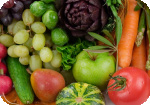| Sunday, 11 May 2025 Home • About Us • Contact Us |
|
|
|
You are here:
Here is further evidence that eating a diet rich in fruits and vegetables drastically reduces the risk of developing breast cancer, or of preventing a reoccurrence. Scientists from China have just released research findings that add to the growing pile of evidence that eating whole, natural food is an effective way of keeping away this disease.
Study Details
Basically, this study found that those eating the lowest amounts of fruits and vegetables had a 47 percent increased risk of breast cancer. Consumption of vegetable and fruit groups such as dark green leafy vegetables, cruciferous vegetables, carrots, tomatoes, bananas, watermelon, papaya, and cantaloupe showed a significant reduction related to breast cancer risk. This was also the same for intake of the vitamins A, C, E, carotene, and fiber. In a previous study, it was found that fruits and vegetables can reduce breast cancer recurrence by 40 percent. The 2005 study examined the relationship between plasma carotenoid concentration as a biomarker of fruit and vegetable intake, and the risk for a new breast cancer event in 1,550 women previously treated for early stage breast cancer. After 5 years of follow-up, those women with the highest plasma carotenoid concentrations had a 40 percent reduced risk for breast cancer recurrence. Research paper details: Rock, CL, et al. Plasma carotenoids and Recurrence-Free Survival in Women With a History of breast cancer. Journal of Clinical Oncology, Vol 23, No 27 (September 20), 2005: pp. 6631-6638. carotenoids are natural fat-soluble pigments found in certain plants, and are responsible for the bright red, orange and yellow in fruits and vegetables. The most well-known carotenoids are: carotene which is found in carrots, spinach, kale and cantaloupe; lycopene which is high in tomatoes, pink grapefruit, watermelon, papaya, and apricots; and lutein, found in dark green leafy vegetables and blueberries. Summary Almost all fruits and vegetables contain health-beneficial properties and have anti-cancer activity. Some in particular that have been well researched are cruciferous vegetables (broccoli, cabbage, kale, Brussels sprouts), umbelliferous vegetables (carrots, celery, parsnips, coriander, parsley), tomatoes, peppers, onions and garlic. Other articles on this site give the specific health benefits of each of these fruits and vegetables, and many others. Aim to eat a range of different fruits and vegetables regularly; in fact a large proportion of your diet should consist of fruits and vegetables.
Link to this article: Show: HTML Link • Full Link • Short Link
Related Articles:
You must be registered and logged in to comment. |
|
 |
 | |
|
|

 Abstract
Abstract 






